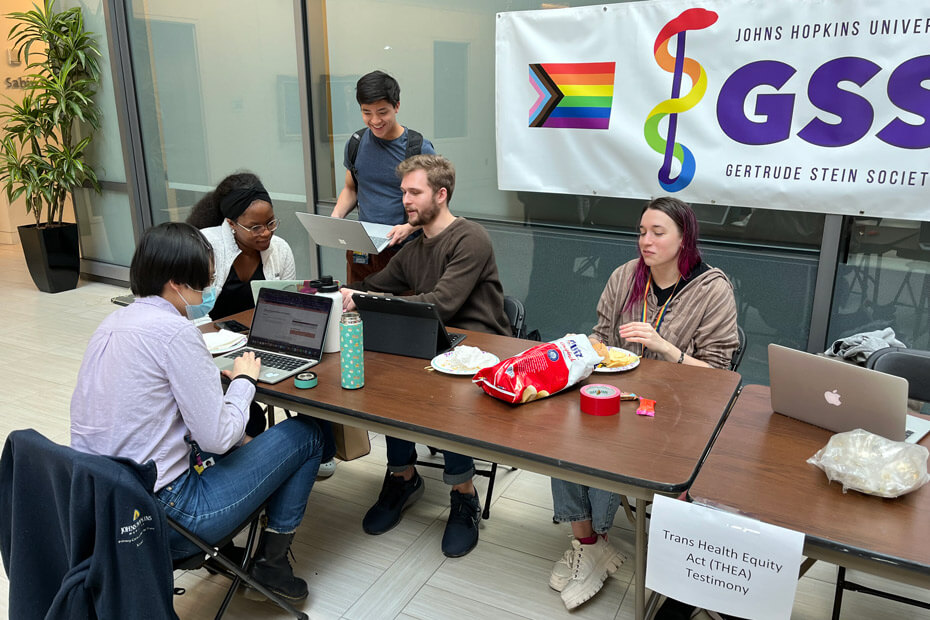Photo courtesy of the author.
On Friday, February 10, members of the Gertrude Stein Society, the School of Medicine’s LGBTQ+ affinity group, staffed two folding tables in the second-floor atrium of the Armstrong Medical Education Building and asked passing students to support the Trans Health Equity Act.
The Trans Health Equity Act, or THEA, aims to expand the scope of Medicaid coverage in Maryland for comprehensive, gender-affirming care. An earlier iteration of the bill failed late into the 2022 General Assembly, likely due to an inability to pass with a veto-proof majority. Delegate Anne Kaiser (Democrat, District 14), with 56 co-sponsors, reintroduced the bill in 2023. On WYPR’s Midday, Delegate Kaiser asserted that “Maryland’s Medicaid plans are based on 20-year-old provisions, where only certain procedures are covered. We have to update our law to ensure that all gender-affirming care that doctors say is medically necessary is covered.”
To contribute to ongoing advocacy work regarding THEA, the Gertrude Stein Society (GSS) collected approximately 30 written testimonies in favor of the bill from students of various graduate programs, as well as residents and faculty members. The organization referred to resources from the Trans Rights Advocacy Coalition to create pre-made letter templates and helped guide students on how to navigate the Maryland General Assembly testimony submission portal. “Tabling for THEA was an incredible experience, as it allowed for meaningful discussions about the significance of advocating for the trans community and the life-altering impact of THEA,” says Ray Kung, a second-year medical student and GSS board member. “It was very encouraging seeing so many students from the Hopkins community show up to support trans rights,” added Ethan Mondell, GSS treasurer and a second-year medical student. “Several people expressed they had siblings or friends affected by recent anti-trans legislation, so it was nice to be able to work towards a bill that’s trans-affirming instead.”
The testimonies collected by GSS joined 105 pieces of written or oral testimony in favor of the bill, including those delivered on behalf of The Johns Hopkins University and the School of Medicine by Dr. Helene Hedian, director for clinical education in the Center for Transgender Health. In her written testimony, she remarked that she has “seen firsthand the improved physical and mental health which comes from living in a body which is finally aligned with one’s internal gender identity.”
The submitted testimonies contributed to advocacy efforts which resulted in THEA’s approval by the Maryland House of Delegates and the Senate, and Governor Wes Moore’s subsequent signing of the legislature into law on May 3, 2023. Once THEA comes into effect on January 1, 2024, expanded gender-affirming care will be made accessible to Maryland’s estimated 24,000 transgender and nonbinary adult residents.
Related Content
- 7 Pieces of Advice for Promoting Gender Equity at Johns Hopkins
- Student Advocates for Sexual and Gender Minorities Healthcare in Curriculum
- LGBTQ+ Health Disparities: Compassionate Care Is Admitting Ignorance
Want to read more from the Johns Hopkins School of Medicine? Subscribe to the Biomedical Odyssey blog and receive new posts directly in your inbox.
